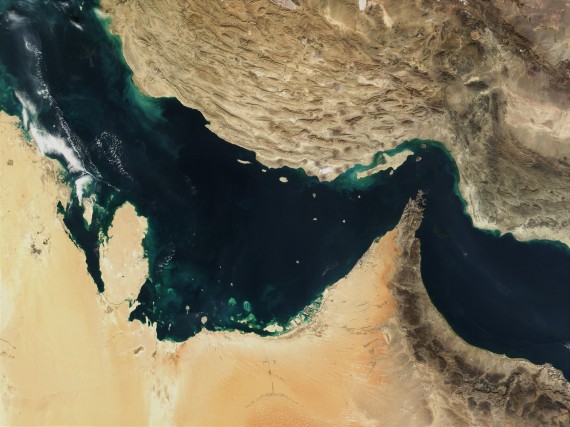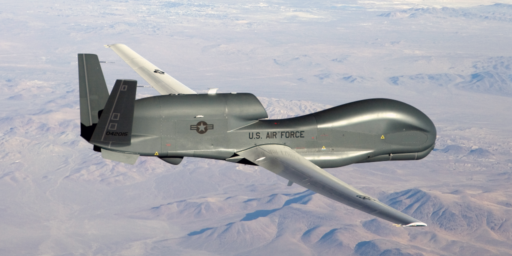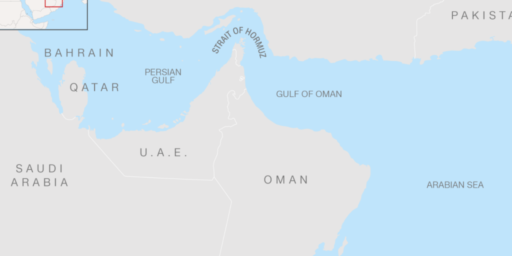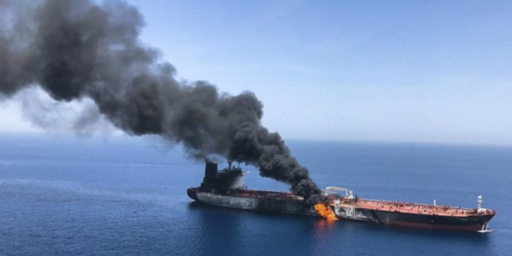U.S. Warns Iran On Straits Of Hormuz
The United States is sending a warning to Iran not to play games with the Straits Of Hormuz:
WASHINGTON — The Obama administration is relying on a secret channel of communication to warn Iran’s supreme leader, Ayatollah Ali Khamenei, that closing the Strait of Hormuz is a “red line” that would provoke an American response, according to United States government officials.
The officials declined to describe the unusual contact between the two governments, and whether there had been an Iranian reply. Senior Obama administration officials have said publicly that Iran would cross a “red line” if it made good on recent threats to close the strait, a strategically crucial waterway connecting the Persian Gulf to the Gulf of Oman, where 16 million barrels of oil — about a fifth of the world’s daily oil trade — flow through every day.
Gen. Martin E. Dempsey, the chairman of the Joint Chiefs of Staff, said this past weekend that the United States would “take action and reopen the strait,” which could be accomplished only by military means, including minesweepers, warship escorts and potentially airstrikes. Defense Secretary Leon E. Panetta told troops in Texas on Thursday that the United States would not tolerate Iran’s closing of the strait.
The secret communications channel was chosen to underscore privately to Iran the depth of American concern about rising tensions over the strait, where American naval officials say their biggest fear is that an overzealous Revolutionary Guards naval captain could do something provocative on his own, setting off a larger crisis.
“If you ask me what keeps me awake at night, it’s the Strait of Hormuz and the business going on in the Arabian Gulf,” Adm. Jonathan W. Greenert, the chief of naval operations, said in Washington this week.
Administration officials and Iran analysts said they continued to believe that Iran’s threats to close the strait, coming amid deep frictions over Iran’s nuclear program and possible sanctions, were bluster and an attempt to drive up the price of oil. Blocking the route for the vast majority of Iran’s petroleum exports — and for its food and consumer imports — would amount to economic suicide.
“They would basically be taking a vow of poverty with themselves,” said Dennis B. Ross, who until last month was one of President Obama’s most influential advisers on Iran. “I don’t think they’re in such a mood of self sacrifice.”
But Pentagon officials, who plan for every contingency, said that, however unlikely, Iran does have the military capability to close the strait. Although Iran’s naval forces are hardly a match for those of the United States, for two decades Iran has been investing in the weaponry of “asymmetric warfare” — mines, fleets of heavily armed speed boats and antiship cruise missiles hidden along Iran’s 1,000 miles of Persian Gulf coastline — which have become a threat to the world’s most powerful navy.
“The simple answer is yes, they can block it,” General Dempsey said on CBS on Sunday.
While U.S. naval and air superiority would leave the ultimate outcome in little doubt, the Iranians could inflict serious damages on civilian and naval shipping in the meantime:
The Revolutionary Guards navy has been steadily building and buying faster missile boats and stockpiling what American experts say are at least 2,000 naval mines. Many are relatively primitive, about the size of an American garbage can, and easy to slip into the water. “Iran’s credible mining threat can be an effective deterrent to potential enemy forces,” an unclassified report by the Office of Naval Intelligence, the American Navy’s intelligence arm, concluded in 2009. “The Strait of Hormuz is a narrow chokepoint that could be mined effectively in a relatively short amount of time” — with disruptions within hours and more serious blockage in place over days.
Although the United States would respond with minesweepers, analysts said American naval forces might encounter layers of simultaneous attacks. The Iranians could launch antiship missiles from their coastline, islands or oil platforms and at the same time surround any American ship with missile-armed speedboats. “The immediate issue is to get the mines,” Mr. Connell said. “But they’re going to have to deal with the antiship cruise missiles and you’ll have small boats swarming and it’s all going to be happening at the same time.”
The United States could take out the antiship missile launchers with strikes from fighter jets or missiles, but analysts said it could take time to do so because the launchers on shore are mobile and often camouflaged.
The tight squeeze of the strait, which is less than 35 miles wide at its narrowest point, offers little maneuvering room for warships. “It would be like a knife fight in a phone booth,” said a senior Navy officer. The strait’s shipping lanes are even narrower: both the inbound and outbound lanes are two miles wide, with only a two-mile-wide stretch separating them.
In the end, though, if the Iranians took the provocative action of closing the straits we would have no choice but to take action. Even not taking into account the American military presence in the area, the impact that closing the straits would have on worldwide oil prices would be catastrophic. By some estimates, the price of oil could spike to $150/barrel or more if such an event happened. Additionally, the U.S. Navy is the only force out there capable of guaranteeing freedom of the seas in such a crucial part of the world. So, like it or not, if something happens we’ll have no choice but to go in and take care of it.
At the same time, though, one has to wonder how much if this bluster from Teheran is real. As the article notes, cutting off trade would be economic suicide for a nation that is, by all reports, already bearing the brunt of years of economic sanctions. Those sanctions may not be hurting the government very much but I doubt they’d want the public to feel much more pain for fear of reviving the protest movement that bloomed in 2009. Of course, if the United States and/or Israel take action against Iran the odds of Iranian action against shipping in the Straits of Hormuz should not be discounted.







I tell you what lets come to an agreement with Iran; we get Israel to stop killing their citizens and they promise to not close the Straits.
“Release the Kraken!”
@Loviatar: You got any proof it’s Israel blowing up the nuclear scientists? The list of suspects is a mile long. And Israel is usually far more precise in its work — I recall one terrorist leader (I think Hezbollah) who was blown up by a bomb in a cell phone. They routinely reduce the warheads in Hellfire missiles to minimize collateral damage, to the point where they’ve often failed to kill their targets.
I’ve seen speculation that it’s Saudi money buying the bombs in question. I dunno how likely that is, but it’s worth considering. I think it’s fair to say Israel had a hand in Stuxnet, but I’m unconvinced on the bombs.
Iran can shut down the Straits. Briefly. And only once.
Pop question: which job would you rather have — Iranian nuclear scientist, Al Qaeda #2, or drummer for Spinal Tap?